REW Governing Council
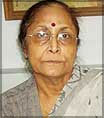
Deputy Chairmen Managing Committee
SNS Foundation
Date of Birth:18th December 1945
Nationality: Indian
Languages:English Tamil Hindi Speaking,
Academic Qualification: M.A Psychology, D.U. 1971, B.SC (Hons) Nursing- DU, 1967
Personal History :
Education: Post Graduate Degree majoring in Psychology, University of Delhi, India.1972. SC Hons in Nursing from Delhi University 1967
Planning and Project Management
- Strategic Planning.
- Programme Management.
- Resource Mobilization.
- Designing MOU- for. entering into partnerships, outsourcing, training workshops dissemination seminars, organizing exhibitions (display of visuals) ,scripts for street shows, role plays (using puppetry theatre artistes).
- Program evaluation including development of tools for measuring- process, output, outcome/impact.
- Focus on scaling up and sustainability for maximizing cost benefit Conceptualization and Development of Programs.
- Organisational Vision/ Mission Definition.
- Vision Alignment.
- Capacity building.
- Development of corporate and community volunteering program.
- Developing the concept of convergence of vertical programmes (strategies for bringing education, reproductive and child health, natural resource management, women’s self-help groups formation, adolescent health, HIV/AIDS prevention).
- Developing paramedics in RCH-Vocational Training-Academic Up gradation through accreditation centers (National Open School, Indian Hospitals Association) for bed-side nursing, out-reach workers, peer educators.Communication and BrandingCommunication for promoting collective ownership of the project processes including evolution of the project design or curriculum, fine-tuning, creating parameters of quality assurance, process of certification and accreditation.
- Communication & Civil Society Mobilisation for Creating Zero Tolerance Zones (Child Rights Violation).
- Video documentation of organizon profile, project process documentation and preparation of annual reports.
- Designing ,pre-testing and production of IEC materials.
- Building value added partnerships.
- CSR (Corporate Social Responsibility) – facilitating interpretation of scope within companies (strategic partners Agilent Technologies, Philips India, Perfetti Van Malle, GE Group, Bechtel India, Fluor Corporation).
- Other Field based NGOs.
- Govt bodies at the local & Central Govt. levels.
- Social marketing of sanitation/hygiene products, fertility control products.
- Concept of Cornerstone Values of life Training and Development.
- Development of Training Content for Trainers of field NGOs working in RCH and S tate AIDS Control Society supported programs in several states of the country.
- Behavior-change programmes for youth and migrant labour working garment industry, un-orgainsed sectors, rural agro-based communities.
- CSR codes for corporates including implementation of Policies for HIV at the work-place, Sexual Harassment, Health Environment Safety Networking:
- Working with the governing bodies of a number of NGO’s and government agencies. (Panchayati Raj Institutions-Village Education Committees, Secondary Schools-Insurance-Volunteerism).
- Coordination with National Women’s Commission- Women’s Cell on Sexual Harassment & Domestic Violence.
- Grantees and Grant making organizations.
Employment Record:
Organisation: SNS Foundation, New Delhi, India
Period: 1994- to date
Position: Executive Director
Brief Description:
SNS Foundation is the social wing of the Anand Group of Industries, India. This corporate house, recognizing the need for a social commitment established the Foundation to render services to the families and the nearby communities in and around their business establishments. However over the years the activities have spread into a wider spectrum and have been focusing on issues concerning community development and motivation all over the country.
Currently the Foundation is an internationally recognized independent organization providing valuable services in the areas of community development. The present responsibility of Executive Director is to ensure that the organization performs to reach higher standards of project management and delivery. The posts of Project Coordinator and Director (Projects) held during the initial years of involvement with the organization have strengthened the ability to understand and improve upon grass-root level management of projects.
Current responsibilities include:
- Overall management of the various units of the Foundation spread over the country. Coordination between the units, administrative & financial reporting and management and projects & personnel management are the main activities. Liaison, creating linkages and interaction between Donor Agencies, Principals, Governmental Departments, recipients and other stakeholders.
- Project design, development and delivery.
- Monitoring and evaluation of ongoing programmes, including initiating measures to improve on delivery standards.
- Responding to human tragedies, Rehabilitation and sustainable development such as Disaster management during earthquakes, Tsunami etc.
Organisation: Katha Khazana
Brief Description:
Promoting Community Participation through training in reaching consensus on site identification for engineering installations (hand-pumps, community latrines, solid-waste collection and disposal sites), in the monitoring of installation works to ensure adherence to standards, in the operation and maintenance of the installations including setting up a water quality laboratory.
Job entailed creation of small-area wise units, networking to form zonal units connected to local govt. support bodies like water supply and sewerage boards, public health department. Also entailed creative use of local cultural resources and innovative integration into communicating task-profiles, attitudes and knowledge packages.
Organisation: Socio Economic Unit, Ganga Action Plan
Period: 1989- 1992
Position: Head of Operations
Brief Description:
Promoting Community Participation through training in reaching consensus on site identification for engineering installations (hand-pumps, community latrines, solid-waste collection and disposal sites), in the monitoring of installation works to ensure adherence to standards, in the operation and maintenance of the installations including setting up a water quality laboratory.
Job entailed creation of small-area wise units, networking to form zonal units connected to local govt. support bodies like water supply and sewerage boards, public health department. Also entailed creative use of local cultural resources and innovative integration into communicating task-profiles, attitudes and knowledge packages.
Organisation: Local Neighbor Community hospital, Danish Govt. aided Area Development Projects, Government of Tamil Nadu, South India
Period: 1979- 1989
Position: Freelance Consultant
Brief Description:
Evolving and facilitating implementation of Communication strategy workshops for field staff/Primary health center staff.
Organisation: CARE - India
Period: 1971- 1979
Position: Senior Research Associate/Programme Coordinator
Brief Description:
As Senior Research Associate: Management support to field research in an integrated health-nutrition-education project for testing feasibility of a weekly take- home food distribution system. Worked in a multidisciplinary team, comprising operation research specialists, nutrition and medical adult /pediatrics specialists
Later as Programme Coordinator all CARE programmes in Tamil Nadu, which were a take-off from the field-research based experience including development and implementation of integrated nutrition programmes with State municipal health centers.
Organisation: Delhi State Govt. Hospital
Period: 1968- 1971
Position: Public Health Tutor
Brief Description:
Public health tutor to trainee staff nurses, Health visitors and student nurses.
Membership in Professional Societies:
- Associated with CII, Community & Social Development.
- Member Technical Assessment & Grants Sanctioning Committee, Mother NGO for Field NGOs in 4 district of Himachal Pradesh under RCH Programmes, Ministry of Health & Family Welfare, Government of India.
- Member Governing Board of SOSVA, an NGO.
- Member Grievance Cell for women employees in Anand Automotive Systems.
- Member RECARD (Regional Committee for Agriculture and Rural Development, NABARD).
- NGO Networks, Kedavri (for Adolescents)
- Anand Bharatiya as its Vice-chairperson (working for women & child development).
- Anand Kala Kendra as Vice-chairperson (Integration of performing arts (theatre/puppetry) and other arts/crafts for communication, skills training)
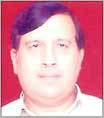
Chair - Managing Commitee
Former Secretary (Policy Planning, Consular & Diaspora)
Ministry Of External Affairs
A truly multi-faceted personality, Mr. J C Sharma has outstanding achievements as a solider, diplomat and scholar. He began his professional career as a Commissioned Officer in the Indian Army (1967-72) and was awarded the “Sena Medal” for Gallantry in 1971 Indo-Pak war.
Mr Sharma joined the elite Indian Foreign Service in 1972 and has served as First Secretary (Consular & Political) and First Secretary (Commercial) in the Indian Embassies in Tokyo and Jakarta respectively. He gave a new direction to India’s commercial relations with Indonesia. Most of the Indian joint ventures in Indonesia were established during his tenure. Indian promoters greatly appreciated valuable advice and support extended by him as First Secretary (Commercial). He also organised Indee 79, the biggest ever exhibition of Indian engineering products in Asia.
A brilliant organizer, Mr Sharma was Director (Protocol) for the 7th Non-Aligned Summit and the Commonwealth Heads of Government meeting in Delhi in 1983. He belongs to a breed of diplomats who enjoy challenges. He volunteered to be India’s Head of Mission in Phnom Penh during the most difficult period of 1982-84. He served as India’s Consul General in Vancouver (1984-88) when it was the nerve center of activities in support of terrorist movement in Punjab. He was also one of the most successful Ambassadors of India in Vietnam (1989-92).
On his return to Headquarters in August 1992, Mr Sharma served a Joint Secretary for the Gulf region and OIC Affairs till October 1993. He acquired expertise in the issues concerning 3 million strong Indian Diaspora in the Gulf region.
Recognizing his flair for developing commercial relations, he was deputed to the newly created post of Joint Secretary (Defense Exports) in the Department of Defence Production. He prepared the first blue print for Defense Exports from India. He also prepared the plans for the first Aero India in Bangalore, which has now emerged as one of the premier Air Shows of Asia. During this period he also served on the Board of Bharat Earth Movers Limited (BEML), a large public sector undertaking manufacturing defence and earth moving equipment and railway coaches. He gave a major push to BEML’s export efforts and helped open several new markets for its products.
Mr Sharma had a highly successful tenure as Consul General Of India in Chicago (1996-2000) where he succeeded in substantially raising the profile of Mid-West region in Indo-US relations. He paid special attention to development of commercial relations with the mid-west region.
Recognizing his expertise on Indian Diaspora, Mr Sharma was appointed the Member Secretary of the High Level Committee on Indian Diaspora. The 600-pages Report of this Committee authored by him now provides the blue print for India’s engagement with its 20 million strong Diaspora. Mr Sharma was also the Member Secretary of the Organizing Committee for the 1st and 2nd Pravasi Bharatiya Divas (Indian Diaspora Day) celebrations. His networking skills, excellent public relations and brilliant organizational abilities were the important factors for the success of these mega events.
As Secretary in charge of Consular Passport and Visa division he introduced bold reforms to simplify the procedures and decentralize the process making it possible to file applications in District H Q and Speed Post Centers. Thanks to his vision entire 10 years data of passports is computerized and available to all Indian Missions and Passport Offices.
An erudite scholar, Mr J C Sharma is an acknowledged authority on India’s cultural relations with South East Asia. He has authored two highly acclaimed books titled “Temples of Champa in Vietnam” and “Hindu Temples in Vietnam” on this subject. These are the first two books ever to be written in the English language on the temples of the ancient kingdom of Champa. He has also been invited in his capacity as Art Historian by world’s leading institutions like Smithsonian Institute, Washington DC, Asia Society, New York, World Association of Vedic Studies, to speak on various aspects of India’s cultural relations with South East Asia. He has maintained close association with NGOs and has taken several initiatives to facilitate their activities in India.
Mr Sharma has taken active interest in social and cultural life of Delhi. He is a member of the India International Centre, Indian National Trust for Arts & Cultural Heritage (INTACH), Institute for Defence Studies and Analyses, Delhi, United Service Institution of India, Delhi, India Habitat Centre (Spouse member), Delhi Gymkhana Club, Roshanara Club and Noida Golf Club. Mr Sharma has a flair for learning foreign languages and has learnt Japanese, Bhasa Indonesia and Vietnamese.
His wife, Dr (Mrs) Kavita Sharma, Principal, Hindu College, is the first woman Principal of a Co-ed College of Delhi University. Mrs Sharma is also a renowned scholar and an acknowledged authority on Mahabharata and India’s aesthetic traditions.
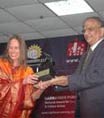
Throughout her life, Pamela has fought to protect our rapidly vanishing forests and wildlife around the world while promoting community conservation that includes environmental payment schemes and income-producing small-scale industries such as Eco-tourism to help the rural poor. Over the last couple of decades, the scope and scale of her work has expanded exponentially.
Today the planet faces ecological disaster for many reasons, from many sources. Putting into practice the advice of Nobel Peace Prize Laureate Al Gore—“First arm yourself with knowledge”—Pamela has dedicated her life to doing just that—learning as much as possible about the various threats to our environment and the survival of humanity on the planet, and then making it her mission to spread that knowledge to make people aware of the critical times we live in and the challenges facing us all. Through her dedication, sacrifice of time, energy and money, as well as concern for the planet and all living things on it, not only has she highlighted the problems, but has offered practical workable solutions to these problems as well.
In the course of her ‘mission,’ Pamela has crisscrossed the Kodagu/Coorg District in which she lives, the state, the country, and even foreign countries to spread her message far and wide through her presentations, talks, and public appearances as well as writing articles for various media. The vast array of different audiences she has reached include students of all ages—from preschool to post grads in college—educators, women’s groups and forums, civic groups and charitable organizations, judges and advocates, government officials and bureaucrats, business groups including the IT sector, environmental groups and other NGOs, ashrams and the general public.
Covering a broad spectrum of environmental and social issues, gearing each talk for the audience in attendance, her talks have included:
- Global warming and climate change
- Decentralization of electricity especially in rural areas, and promotion of truly ‘green’ alternate energy systems and solutions, ‘green solutions’ including:
- Solar power for water and electricity,
- Wind power,
- Tidal power,
- Biogas
- Ocean/geo-thermal
- Conservation of natural resources
- Reducing, reusing and recycling of waste including composting of food/agricultural waste, e-waste (electronic waste such as mobile phones, computers, refrigerators, TVs, etc.)
- Protection of forests and the wildlife they contain, as forests are the watersheds of the world from which spring forth vital water sources (like streams and rivers) and are key as mitigators of global warming/climate change, this protection also helping to defuse dangerous animal/human confrontations caused by forest fragmentation due to human encroachment on the depleting forest cover—this fragmentation forcing animals into villages and farmlands in order to migrate and search for food and water.
- Afforestation projects using native trees on a massive scale to expand forest cover and help in the aforementioned areas.
- Balance of Nature and species extinction—its impacts on society such as loss of biodiversity, food security, health issues, dangers of GMOs (Genetically Modified Organisms), the dangers of chemical use and poisonings, and promotion of organic agriculture.
The talks, presentations and articles, which have touched the lives of tens of thousands, are in and of themselves socially responsible actions as awareness is the first step to finding solutions to the problems facing society. But in moving from theory to practice, these issues have been addressed and solutions implemented in the Sanctuary set up by us in order to demonstrate both their practicality and viability, the Sanctuary being an example for others to emulate.
Bordering the Brahmagiri Wildlife Sanctuary, large areas of the 300+ acre Sanctuary are original forest, not only protecting vital water sources, but also affording easy access to both water and food for numerous species of animals, helping to curtail conflicts with man. This also helps to protect the treasure trove of biodiversity of flora and fauna unique to the mountains of the Western Ghats, biodiversity being key for new sources of medicines, foods, building materials, etc.
With the forest intact and wildlife in balance, pests like insects that destroy crops and spread illnesses like malaria, dengue fever, etc., are kept under control. Spreading awareness of the importance of Nature’s balance in all these areas has helped reduce greatly the incidence of both illegal logging and poaching while enhancing water quality (since the use of chemical pesticides/herbicides is eliminated) and conservation, all of this contributing to improvement of the general health of the local people.
The recent inclusion of Eco-tourism cottages within the Sanctuary has opened up job/income opportunities for many in the community and serves as a model for similar small-scale businesses that emphasize conservation over consumption, making both the forests and wildlife far more valuable alive than dead to the local populace. The Sanctuary is chemical-free with all produce being grown organically with recycling and composting practiced in all areas. All electricity is generated through green alternate energy systems—solar, wind, small hydro and biogas.
Thus the Sanctuary has become a living model that is constantly visited not only by members of the local panchayat and community, but also by bureaucrats and officials, conservationists and businessmen. In addition, it has become an education center for students of all ages, with naturalists and scientists carrying out studies in various fields, the results of which help expand society’s understanding of Nature and the natural cycles in which we live our lives.
One example of the far-reaching effects this has had is in the area of rural energy production. Most rural villagers rely on LPG, kerosene or wood to cook their food and heat bathing water. The cost, lack of stock of both kerosene and LPG, and the distance villagers have to travel to obtain either makes it difficult for many to use and afford. Hence, villagers turn to wood. A family of 4 burns up over 10 kgs. of wood every day when it is used as the primary fuel source. This translates into a tremendous demand on the forest, leading to massive deforestation and release of CO2 into the atmosphere, exacerbating global warming.
A viable, inexpensive and convenient solution to this problem has been demonstrated by two biogas plants recently constructed in the Sanctuary, which now provide all cooking fuel for both the main quarters and eco-tourist guests. Cow dung is readily available in the rural communities and hence an ideal source of energy. In addition, the dung becomes nitrogen-enriched fertilizer for use in farmers’ fields after going through the plant, helping to cut the use of dangerous and expensive chemical fertilizers. Upon inspection of our biogas plants, the local panchayat is now taking up the project for the village, with our help and guidance. This project alone affects thousands of poor villagers in the area.
From all the aforementioned, it is evident that Pamela has been socially responsible to say the least. In addition, her articles, presentations and talks—some given directly to government officials and the ‘powers that be’—help to stimulate, encourage and even compel others to follow her example and ‘ACT NOW’ for the sake of the betterment of society, for this generation and the next. Hence, she is a deserving candidate for ‘the Lifelong Fight for Social Justice’ award.
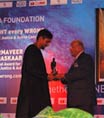
Raj Bhandare is an architect, an artist, an entrepreneur. Fascinated by Indian spiritualism and symbolism, his paintings express the roots of Indian spiritualism. Influenced by the plight of our soldiers in Kargil, a plan for a T-shirt exhibition turned into a full-fledged company called Nirvana. Through his T-shirt company, he displays socio-political and cultural messages that are typically related to the Indian scenario, and publicise social ills in new and innovative ways.
Raktim Mukhopadhyay is a senior consultant for organizations in the government and non-government development sector. He has almost three decades of experience working for the Government of India and other organizations in the field of social research, rural empowerment and capacity building. He is an expert on social research methods including urban and rural survey, data processing, tabulation, and data analysis, editing and preparing research reports, etc. In his professional career, he has conducted several research studies on behalf of the Government of India, UNICEF, UNESCO, etc. He is an honorary director with iCONGO, New Delhi; Director, Bangiya Unnayan Parishad, Calcutta and is also associated with the Association for Democratic Rights (ADR), New Delhi and Centre for Budget and Governance Accountability (CBGA), New Delhi. He is also a resource person/ guide for Nehru Yuva Kendra Sangathan, New Delhi.
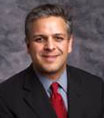
Rob Dhoble leads Omnicom Group's worldwide healthcare services business, which supports the brand development and commercialization needs of the pharmaceutical, biotechnology and medical device industries
Prior to his current position, Mr. Dhoble served as President of Acuity Health Group, a customer relationship marketing consultancy within Rapp Collins Worldwide, a full service direct marketing agency within Omnicom Group. Prior to joining Omnicom he served as COO of Torre Lazur Healthcare Group, a healthcare communications unit of McCann-Erickson Worldwide. Mr. Dhoble has held a variety of marketing and sales management positions within Lederle Laboratories, Wallace Laboratories and Rorer Pharmaceuticals. Mr. Dhoble has been featured in leading healthcare industry periodicals including Pharmaceutical Executive, The Economist, Product Management Today, American Demographics, Medical Advertising News, Medical Marketing & Media, and Brandchannel.com. He is a graduate of Temple University.
Commenting on Rob Dhoble's addition to the board of directors, Shmuel BenTov, TACT's President and CEO and Chairman, said, "Rob adds an important dimension to our board's credentials. Rob Dhoble added, "TACT has cultivated an impressive list of Fortune 1000 clients over its 20-year history, with an increasing focus on services to the pharmaceutical industry.
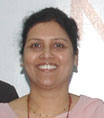
Chief Executive Officer - NASSCOM Foundation
Rufina Fernandes is at the helm of NASSCOM Foundation’s (NF) commitment & vision. As Chief Executive Officer, she manages overall operations of the Foundation, with an active emphasis on the group goals, planning & strategy. Based in Mumbai, Rufina brings experience & passion to reach out to the under-served.
NF was formed with a commitment to empower & transform the lives of the under-served through application of ICT. Rufina’s dynamic leadership & direction made sure that the Foundation, in a short time, successfully launched number of initiatives & projects like Rural Knowledge Networks (RKNs), CSR Initiatives etc.
Prior to joining NASSCOM Foundation, Rufina was Sr.Vice President (Strategic Initiatives & Head - CSR) at GTL, where for more than a decade she was heading functions like Corporate Communications, Physical Resources & Administration, Corporate Social Responsibility (CSR), besides being part of several other strategic initiatives, like re-engineering & the 'people first' program. Till date, she continues to be on the Board of Trustees of GTL Foundation.
She has also been actively involved with All India Chess Federation for the Blind (AICFB), an organization that promotes chess for the visually challenged. She was the Chairperson of AICFB for the period 2002-2006 & is currently an Advisor to them.
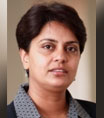
Schooling
Carmel Convent School
Delhi Public School,Mathura Road
Educational qualification
- B.A (German)
- M Phil. (Semiotics)
- LL.B,
- Certificate course in “International humanitarian law, human rights and refugee law “
- PGDM from IIM,Indore
Lady officer from first batch of Women Commissioned Officer in the Indian Army Judicial Service as Deputy Assistant Judge Advocate General where job profile focused on devising preventive legal mechanisms and enforcing corrective measures for the Army.
As the first woman officer heading Woman cell,National Human Rights Commission, evolved initiatives and ensured their logical execution with special emphasis on issues relating to crime against women, children and gender discrimination.
First person in Indian History to become Lok Umidwar i.e Peoples Candidate in the Lok Sabha Elections.
Active involvement in ‘HELP AIDS INDIA FOUNDATION’ which involved extensive liaison and networking with National and International bodies for generating awareness and garnering support for vital social cause.
Publications/Fellowship
- “Human Rights in Pakistan.” published in Journal of Indian Council for World Affairs, New Delhi
- "Human Rights Concern and Conditions of Women in Afghanistan” published in Journal of Indian Council for World Affairs, New Delhi.
Fellowship
Conferred with Henry Dunant Fellowship by ICRC (International Committee for Red Cross) in recognition of my article on ‘International Humanitarian Law and Indian Army’.
Presently I am President, Delhi State PROJECT VIJAY
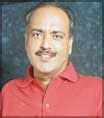
Organization:
Organization:Samarthya,National Center for Promotion of Barrier-Free Environment For Disabled Persons (A project of Samarthyam- Regd. No. 35922)
Designation: Honorary Founder Member & Project Director
Postal Address: B-181, Mansarovar Garden, New Delhi-110015 (India).
Tel: 91-11-41019389, (M) 9818202910
E-mail: sanjeevsach@hotmail.com
samarthyaindia@yahoo.com
Web site: www.samarthyaindia.com
Personal details
Date of Birth: 4 September 1964
Ed.Qualifications:Master of Arts (Political Science), Master of Philosophy (Political Science), University of Delhi Research Officer (Class I), Government of India
Training Experience: 2000, United Nations Economic and Social Commission for Asia and the Pacific (UNESCAP) on Promotion of Accessible Tourism at Bali, Indonesia. 2002, UNESCAP on Non-Handicapping Environment for Disabled People at Bangkok, Thailand. 2004, Asia Pacific Development Centre on Disability (APCD) on Non-Handicapping Environment Workshop for National Trainers and Policy Makers, Bangkok (Thailand) 2004, Presented papers at 10th International Conference on Transport & Mobility for Elderly and the Disabled, Hamamatsu, Japan.
Awards: 2001 Acharya Vinobha Bhave National Volunteer Award, 2003, National Award presented by Hon’ble President of India2005, Cavinkare Ability Mastery Award 2005, Social Act of Courage- 13th Red & White Bravery Gold Award, Delhi State (Samara)
Disability: Muscular Dystrophy (assisted wheel chair user) needs escort for activities of daily living.
Sanjeev Sachdeva is presently member of Working Group on Empowering the Disabled (Barrier Free Environment and Social Awareness), Ministry of Social Justice & Empowerment, Government of India; for the XI Five Year Plan: 2007-2012.
Profile of Activities:
1) Awareness & Capacity Building Excursion Tours: Since 1996, organized more than 60 tours for persons with severe disabilities to places of historical, cultural, religious and tourist interests’ promoting the concept of Barrier-Free Tourism.
2)Dilli Haat: In 2002, conducted access audit of Dilli Haat (a popular Tourist spot in Delhi) to make it “Accessible to All”. Delhi Tourism & Transport Development Corporation (DTTDC), Government of Delhi; implemented the recommendations forwarded in 2003-05. Dilli Haat received National Award (President’s Award) for Promotion of Barrier Free Environment (BFE) on 3rd December 2005, International World Disability Day. A photographic exhibition on “Making of Barrier Free Dilli Haat” was jointly organized by Samarthya and Delhi Tourism in December 2005.
3)Bus Rapid Transit System (BRTS), 2003: Associated with Transportation Research & Injury Prevention Programme (TRIPP) Indian Institute of Technology (IIT), Delhi on accessible designs for low floor bus, bus shelters and corridors/dedicated lane for the proposed BRTS.
4)Delhi Metro Rail Corporation (DMRC): An access audit of the sample station was conducted in April and followed it till its completion in November 2002. Samarthya is associated with DMRC to make the system user friendly and 110 stations of Delhi Metro to have Universal Design. The work is still being followed. Samarthya is now associated with Bangalore Metro Rail Corporation Ltd. (BMRCL) also, to provide Universal Design in the upcoming Metro in Bangalore. A presentation of DMRC was made at BMRCL in August 2006 and the suggestions/recommendations were forwarded to MD, BMRCL.
5)For Rehabilitation Council of India (RCI) (Statutory body under the Ministry of Social Justice & Empowerment, Government of India) 2003:Resource Persons at “Summit of the Minds”, DelhiOrganized ‘Training of Trainers Course for Promotion of Non-Handicapping Barrier Free Environment for RCI at Bangalore & Chennai.
6)Resource Persons at Training of Trainers Course for Promotion of Non-Handicapping Barrier Free Environment and creation of Resource Pool of Access Auditors:Post Earthquake reconstruction work in Gujarat, 2003 National Seminar on PwDs and Elderly, Kolkatta (West Bengal) 2004, organized by the Ministry of Social Justice & Empowerment and IIT, Kharagpur Department of Social Welfare, Government of Goa, Goa 2004
7)Office of the Chief Commissioner for Persons with Disabilities(Statutory body under the Ministry of Social Justice & Empowerment, Government of India): Resource persons for “Creation of Resource Pool of Access Auditors” 2-day Workshops at Lucknow (Uttar Pradesh), Chandigarh (Union Territory) and Raipur (Chattisgarh), 2005-06. Around 300 participants from 14 States with diverse backgrounds including architects, engineers and urban planners and NGO’s were trained on importance of BFE and practical field visit i.e. access audit and report presentation.
8)Following the Post-Tsunami reconstruction work: Organized 3-day workshop in June 2005 and August 2006 in Port Blair & Rangat, Andaman Island; project supported by international NGO Handicap International.
9)Access Audits (Facilities Check): of more than 30 public utility buildings are conducted in various States.
10)Disability Awareness/experiential Exercise Training Workshops: I) 5 workshops for Auto rickshaw/three wheeler drivers (Badge Training) 2003, State Transport Authority, Burari, Delhi and Delhi Transport Corporation (DTC) bus drivers II) School of Planning and Architecture (SPA), Delhi, 2005- Students of Transport Planning, Architecture and Industrial Design III) Central Road Research Institute (CRRI), Delhi, 2006- Scientists, Researchers, Academicians, Transport, Town & Urban Planners.
11)Organized First National Conference on Accessible Transportation:“Mobility for All”, 2006: in academic collaboration with Transportation Research & Injury Prevention Programme (TRIPP) Indian Institute of Technology (IIT), Delhi, 17-19 March 2006. The very purpose of this Conference was to bring the Government, service providers, stake holders and user groups on one platform and Draft Implementation Policies and Guidelines on “National Policy on Accessible Transportation on the basis of Universal Design ” addressing the concerns of PwDs and senior citizens. This Conference was the first endeavour of its kind in the country. The National Conference was supported by Union Tourism Ministry and Ministry of Social Justice & Empowerment, Government of India.
12)Publications: a) Prepared the first Technical Brochure “Access for All” on Internal & External Design Considerations b) Co-Author of the “Training Manual to promote Barrier Free Environment- Guidelines for Training of Trainers”, 2005 published by Rehabilitation Council of India (RCI)
Research Studies
“Accessibility of Indian Railways”, 2005: Includes users’ group perspective; facilities check of stations, reservation centre and compartment for disabled and recommendations for making Railways accessible. Low cost, tried and tested designs from developing countries and user perspective (disabled persons) and recommendations were forwarded to Research Design Standards Organization (RDSO), Ministry of Railways and other concerned departments. Samarthya is currently working on designs of accessible Railway air conditioned coaches with toilets. Recommendations are under positive consideration by RDSO.
“Promotion of user-friendly Public Transport Systems (Bus & bus shelters) in India”, 2005: Conducted a Research Study to provide user groups’ perspective on bus shelters, Low Floor Buses (LFB) and upcoming Bus Rapid Transit System by the Delhi Government with the objective to evaluate the existing infrastructure, to assess and document the present situation and to provide concrete direction involving the user groups on how to make public transport user friendly. Prepared Cost effective plan compatible with LFB (based on the principle of Universal Design) and a prototype at the Hauz Khas Bus Terminal was constructed by Delhi Transport Corporation (DTC) in March 2006.
“Promotion of user-friendly Public Transport Systems (Bus & Bus Shelters) in Delhi”, 2006: During the course of research study on accessibility of buses and Bus Q Shelters (BQS), suggestions to make the new bus shelters as per the prototype were forwarded to concerned departments. The entire route (on which the Low Floor Buses are plying) i.e. from Hauz Khas terminus to Shivaji Stadium terminus has been selected for the same. Ministry of Social Justice & Empowerment sanctioned Rupees 10 million to DTC to make 70 bus shelters. Drawings and sketches with universal designs of Bus Queue Shelters are being considered by both DTC - 25 BQS and New Delhi Municipal Corporation (NDMC) - 197 BQS. Samarthya is monitoring and evaluating the construction process.
Currently developing “Research & Design for making of Braille Registration plates and Audio Meters in Auto Rickshaws”
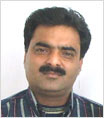
Recipient of Acharya Vinobha BHe has been promoting inclusion of children with disability in to the mainstream since 1994. His attitude, mental make-up and inclination towards the well-being of society in general and persons with disability in particular have set an example. His work is very demanding. He carries out interaction programmes at various schools to bring our ordinary children and children with disability together mentally, physically and psychologically.
His motto is “Catch them Young. He believes that psychological acceptance precedes physical acceptance and that change should begin at the grassroots. “Children are tomorrow’s managers, if they are educated about disability they will not hesitate to offer employment to the disabled.”
Interaction programmes organized by him invited the attention of media, other NGOs and a large number of achievers with disability. Even Government organizations like the Rehabilitation Council of India took notice of his work and provided him funds to organize the workshops at national level.
Since inception he been instrumental in :
- Setting up 50 Disability Awareness Centres in various schools including Government, Aided and public schools
- Sensitizing around 10400 school children from regular schools.
- Sensitizing around 4815 school children from special schools.
- Sensitizing around 250 school teachers from special schools
- Sensitizing around 550 school teachers from regular schools.
- Launching a HELP LINE SERVICE on experimental basis exclusively for differently abled
- Organizing several workshops for regular school teachers and special educators, counsellors etc. and several cultural programmes for school children, parents and teachers.
- Organizing high profile integrated MONSOON MOOD party at the Austrian Embassy by inviting achievers with disability and disabled artists along with many other achieves like Vinod Dua, Jatin Das, Shovana Narayana, Satish Gujral etc., which was covered by print and electronic media. This party was first of its kind.
- Organizing first of its kind integrated Quiz Contest on the theme “Austria”.
- In addition to the above, Brotherhood’s work was recognized by the team of United Nations Volunteers during this International Year of Volunteers-2001 and collaborated “YOUNG VOLUNTEERS FOR PERSONS WITH DISABILITY” campaign in Delhi Schools.
Other Achievements:
- Played a major role in getting issue the circular from the Delhi Chief Minister regarding the admission of children with disability in normal schools
- Motivated young volunteers and created a team of about 40 volunteers who are now working in different schools in the capital
- Successfully organized
- Two International Special Film Festival on disability in Delhi, Bhopal, Gwalior, Amritsar etc. and has already sensitize around 35000 people on various disability issues during the festivali
- Community awareness programme through the medium of films and documentaries in community like JJ Clusters, schools, hospitals etc.
- In the process of setting up first of its kind National Disability Film & Resource Centre. Already collected more than 100 documentaries and films from India and abroad with permission to screen in public.
Besides, Satish Kapoor has been involved in organizing a large number of workshops to sensitize media-persons on various issues pertaining to people with disabilities.
have National Volunteer Award-2001,
have National Volunteer Award-2001
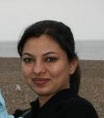
Shuchita Gupta has a successful professional background. She was a marketing executive in Oxfam trust, New Delhi. She was the ambassador for the organization to create a niche for Oxfam Trust in the fundraising market, through relationships with marketing and communication professionals. She is an assistant manager, Child Relief & You – Resource Mobilisation, New Delhi, India. She is also a senior, Price Water House – Assurance and Business Advisory Services, New Delhi, India. She also conducted field audits for LG Electronics, Cushman & Wakefield, and Tata Mc Graw Hill. She was also a SUMMER ASSOCIATE, Hughes Software Systems, Delhi, India
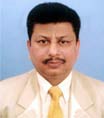
With an experience of over 23 years in different organizations Sunil Gupta is involved in strategic management functions, formulating and implementing policy and related issues and decisions related to Systems and Administration. He has worked extensively on Knowledge Management, Business Intelligence, Networking, Internet, E-Commerce, WAP and related technologies. Apart from software development, he has also carried out various project appraisals and techno-economic studies related to various policy issues and long term planning in the Steel Sector. At present with the Economic Research Unit of Joint Plant Committee (affiliated to the Ministry of Steel) as chief manager (Systems, Personnel & Administration).
He is a senior member of the Computer Society of India and has held senior positions including Chairman (honorary) in the Society which is committed to the promotion and expansion of growth and development of the I.T. industry in India and abroad.
He is also a member of the Advisory body/Governing council in various leading associations, institutions, and organizations including Assocham (ICT, Knowledge, Infrastructure) Committee, FICCI and CII industrial bodies.
He is also a Special Officer with Delhi Traffic Police.
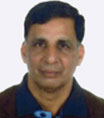
Born in Delhi on 16 September 1958, Sunil Nanda was raised in Roorkee. After schooling, he joined the B Tech degree program at NIT, Kurukshetra in 1974. On being selected to join the National Defence Academy, Khadakvasla in 1975, he left his engineering degree to pursue a more patriotic career in the Armed Forces. Sunil was commissioned into the Indian Navy in 1980 and served in it for 27 years. Sunil Nanda has also worked with a former Prime Minister, where he received his grounding in political affairs. In the social arena, he helped his parents in establishing a school and a charitable hospital for the underpriveleged sections of the community. As City Head of NCR for the Professionals Party of India (PPI), he is committed to building and presenting a clean and professional political alternative to the people of NCR.
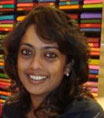
Sushma is a multi faceted and multi talented award-winning artist. She is a respected Actor, Dancer, Painter, Singer, Composer & Producer. She retired from acting in main stream cinema and now is solely concentrating on producing high quality and meaningful theatre and cinema through her brain child, Katha-kar. She is the founder-manager of an NGO, Akanksha, which works for the visually impaired children, children with special needs and cancer patients. She produced a path breaking music video ‘KASH’
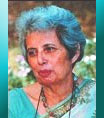
Ms. Tara Sinha, is a veteran in the field of Advertising, Public Relations, External Affairs, Issues Management and Corporate Communications with over 50 years of experience in England, India and the USA. She has authored articles and presentations on topics related to quality of life programs. She is a recognised Advisor on marketing and a range of other corporate areas involving relationship issues. An active Columnist and a speaker on advertising and quality of life communications, she has authored two regular columns: one in a national daily and the other in the country’s leading marketing and advertising journal.
Her professional memberships include:
- Governing Council of India Habitat Centre
- The Chartered Institute of Marketing, UK
- The Delhi Advertising Club, India
- Market Research Society, UK (past)
- The Association of Qualitative Research Practitioners, UK (past)
Ms. Sinha completed her Senior Cambridge School Certificate – UK and CAM Diploma – Advertising Association/The Chartered Institute of Marketing, UK at a time when even secondary education for Indian women was a rarity.
She started her career with S H Benson, London in 1952 and was the Founder Director of Clarion Advertising Services Limited, later Clarion-McCann Advertising Services Limited. After gaining valuable experience with Coca Cola in India and USA from 1973 to 1983, she returned to head Clarion till 1985. She promoted Tara Sinha Associates in 1985 and founded ADMAR and Result Pvt. Ltd. in the same year. She retired as President and CEO of Tara Sinha McCann Erickson Pvt. Ltd. and Chairperson of both Admar and Result in 1995.
She started her career with S H Benson, London in 1952 and was the Founder Director of Clarion Advertising Services Limited, later Clarion-McCann Advertising Services Limited. After gaining valuable experience with Coca Cola in India and USA from 1973 to 1983, she returned to head Clarion till 1985. She promoted Tara Sinha Associates in 1985 and founded ADMAR and Result Pvt. Ltd. in the same year. She retired as President and CEO of Tara Sinha McCann Erickson Pvt. Ltd. and Chairperson of both Admar and Result in 1995.
Ms. Sinha has literally been through the genesis of the Indian advertising industry. She has been a key planning member for communications and strategies for several mega brands.
Since her Advertising days, she has been the Chairperson of Indian Institute of Mass Communication, New Delhi and is currently Member, Advisory Council IIT, Delhi and Chairperson, Advertising Sub-Committee, ASSOCHAM.
A role model as a well-known advertising guru, Ms. Sinha has been responsible for spearheading the advertising movement in India. She has been one of the rare women leaders in the field of Advertising and Communication not only in India but the world at large and has been referred to as the “Mother of Indian Advertising Industry” by her peers.
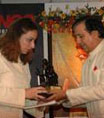
Vandana believes in the philosophy "Care, Stand up, Do something and make a difference”. After participating in the Lead India campaign, she feels she has emerged a stronger and more empowered person. She has initiated the first ever support group in India named ‘360 degrees back to life’ for those going through a breakdown of relationships. She has also actively participated with an NGO that promoted a waste management technique endorsed by the United Nations.
Humanitarian: An intrinsic interest in helping people, rather than being an armchair intellectual, led me to form the first ever support group in India named “360degreesbacktolife”*for those going through a breakdown of relationships. 360 degrees back to life is a support group that provides non-judgmental support to those going through divorce. It is the first group in India that provides a positive perspective to and focuses on rebuilding your life even while going through a divorce. This has met its fair share of success, but I feel we have a long way to go. In an interaction with Gloria Steinem I realized that this is the case even in America. A basic interest in human behavior led me to study Human Psychology.
Writing and Reading: I have been inclined towards being a voracious reader since childhood coupled with a habit of keeping a diary. These two interests have led me to write a book called 360degreesbacktolife- a litigant’s humorous perspective on divorce*.The book is described as a guide to anyone going through a divorce. It is different as it lends a positive spin to a negative topic.
It does not advocate divorce but helps you to cope with it in case it happens. It has received wide acclaim both in India and overseas*.The book has further helped my cause of “helping people rebuild their lives while going through a divorce”.
Environment: I was working with a NGO* that promoted a waste management technique endorsed by the United Nations. This was an uphill task in India where the focus on environment is minimal. This became a huge success and was featured in all the local media like-Times of India, International Media like-CNN*. I also studied waste management informally for 6 years.
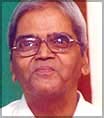
V. R. Jathar is a Director – Corporate Social Responsibility. He is working with Bombay Chamber of Commerce and Industry for over 12 years and has looked after various departments like Corporate Social Responsibility, Environment & Safety Department, Marketing & PR , Urban Infrastructure and Energy. He has helped to write many books as listed below :
- Corporate Social Responsibility Handbook funded by UN Foundation
- Four Modules on Socially Responsible Business, funded by European Union are :
- Planning and implementing CSR activities
- Monitoring and evaluating CSR activities
- Reporting and communicating CSR activities
- Technical regulations required by SME's to access EU marketplace
CSR department of Bombay Chamber had undertaken a project on “Workplace Interventions for HIV/AIDS: Prevention and Control” in association with Avert Society, funded by USAID. He has also helped to write a manual on ‘HIV/AIDS Management at Workplace’ under this project.
He is graduate in Arts with English literature as special subject and possesses a post graduate qualification in Journalism, Public Relations and Administrative Management from NMIMS.

